22 Dec 2014
How To Drag A Family Out Of Denial
Denial is a powerful force, not for change, but for maintaining the status quo. We tend to think of the addict as being the one in denial, but often the people around her are also heavily in denial about the problem. Denial is something that can be useful at times. It may keep us sane in the face of something terribly traumatic. Most of the time, however, denial keeps us from making positive changes.
If you have an addict in the family and everyone else denies that there is a problem, make an effort to drag them out of their inertia to help your loved one.
Denial And Addiction
 Denial is a common feature of addiction. It allows the addict to make excuses and keep using. Addicts often keep themselves in denial and can’t get help until they fully admit to having a problem.
Denial is a common feature of addiction. It allows the addict to make excuses and keep using. Addicts often keep themselves in denial and can’t get help until they fully admit to having a problem.
On the other side of the coin are the loved ones in denial. It’s understandable to see this happen. Parents, for instance, may find it impossible to admit their child is a chronic drug user or an alcoholic. Other members of the family may be in denial because conflict within the family changes the dynamic and upsets the balance.
These family members may think they are keeping everything on an even keel, but the truth is they are only enabling the addict. They are making the situation worse and allowing the addict to continue on a downward spiral. If you are the one family member not in denial, it may be very difficult to speak up. You are the one rocking the boat and everyone else reacts as if you’ve lost your mind.
How To Break Through Family Denial
If you really care about your loved one and your family, you can try to break down the wall of denial. Remember that you may not be successful. You can only do so much, and you can’t force people to change. The best you can do is to try to change their minds, convince them to see the truth and offer your love and support to the addict.
- Show that you are serious – It isn’t easy to go against what everyone else is seeing. If you have been quietly putting a bug in the ear of anyone who will listen, it’s time to step up and take a bolder stand. Hold a family meeting without the addict. Confront your family head on and show them that you mean business. This straightforward approach may jolt some of your family members out of complacency.
- State the facts – Before you hold the meeting, prepare a list of facts. Present your family with concrete examples of how your loved one displays the signs of addiction. Lead with facts rather than emotions and they may take you more seriously.
- Remain calm and be patient – Give your family time to let the facts sink in. If no one gives up his or her denial immediately, don’t get frustrated. Let it go for a few days and then come back to family members individually. You may find that some are prepared to listen to you now.
- Offer help – When all else fails and your family remains in denial, give your love and support to the addict. You can’t always change minds, but you can offer your help. Tell your addicted loved one that you are there for her when she is ready and have resources for treatment prepared.
Denial may be powerful, but so is the care and love you have for your family. Do what you can to break through the denial, but recognize when you can do no more.
Find Out If You Are An Enabler And How To Stop Enabling Now!
Your Addicted Loved One & Your Family Are Worth It – Call Us Now For Help
Including Help Setting Up An Intervention !
In June of 2014, the Delaware News Journal partnered with Christiana Care to host a forum on the heroin crisis gripping the state, but several questions from audience members were left unanswered. Panelists at the event willing to work with the Delaware News Journal have offered to answer some of these questions in an ongoing feature, and Don Keister, co-founder of the anti-addiction group atTAck and whose son died of heroin addiction in 2012, has stepped forward for the task. The question he answered revolved around what you should do when an adult child who lives with you—and has children of his or her own—is struggling with addiction but won’t get help, and his response offers important advice to anybody suffering similar issues.
The Three Cs For Family Members Of Addicts
Keister offers a core piece of advice from Al-Anon: remember the three Cs.
You didn’t cause it,
you can’t control it
and you can’t cure it.
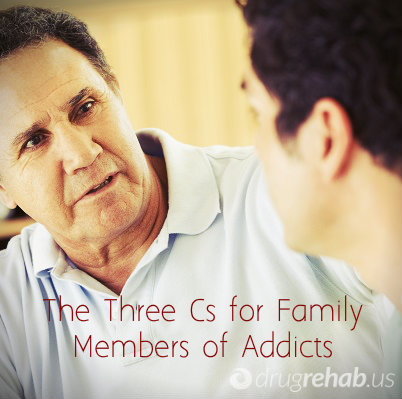 If someone you care about is suffering from addiction, there’s an inclination to try to take too much on your shoulders or even to feel guilt, but this is unhealthy.
If someone you care about is suffering from addiction, there’s an inclination to try to take too much on your shoulders or even to feel guilt, but this is unhealthy.
You’re in no way responsible for what is happening. It’s only natural to want to fix the problem for your child, but addiction isn’t like a scraped knee or a period of minor financial trouble: it’s not something you can rectify for them.
By trying, all you’ll do is make yourself more stressed and unhappy. It may seem puzzling given the situation, but you need to care for yourself as well as your family member.
That’s the real purpose of the three Cs: you need to truly understand that you aren’t to blame, and you can’t heap all the responsibility onto your own shoulders.
No Single Solution To Recovery
Sadly, there isn’t a single road you must follow to recovery. You need to think about what works for you and your family as individuals, but it is important that you’re there to offer support. You need to continue to love your child, and of course the same goes for your grandchildren.
Although you can’t force somebody to get help, you should do whatever you can to support and encourage your son or daughter to go into recovery. Even if your child won’t get help, you shouldn’t blame him or her for the issue either; addiction has many causes and it isn’t productive to become angry with or resentful of somebody struggling with it. Your child always needs to know you’re acting out of love and concern for his well-being.
Addiction As A Family Disease
Keeping all of that in mind, it’s important you recognize that addiction is a disease that affects entire families. The most obvious affected parties are your grandchildren: your son or daughter is unlikely to be capable of offering the level of parental care they need, and this is one area where your support is invaluable.
However, as the three Cs point out, you need to care for yourself too. The challenge is staying as healthy as you can while still being there to help the entire family unit—including the addict—get through this together. This is especially important if you’re all living together, but it makes it all the more difficult to avoid taking too much responsibility yourself.
Importance Of Getting Additional Recovery Support
That’s why getting additional recovery support is essential. Even if the addicted individual won’t get help, groups like Al-Anon exist to offer support to the loved ones of addicts, and can help you get through the problems you’re facing. Addiction isn’t easy for anybody in the family, and if you’re having difficulty, help is available.
Keister’s advice might not have been what you were hoping for, but it’s realistic, and attests to his personal experience with the problem. As much as you may want an easy fix, it doesn’t really exist. Things can and hopefully will get better, but until then, all you can do is be as supportive as possible and make sure you look after yourself, too.
If You Need Help With A Family Member’s Addiction – Call Us Now!
01 Dec 2014
Don’t Skimp On Your Time In Rehab
Getting treatment for drug addiction is the only way to heal from this terrible disease. If you or a loved one is struggling with drug abuse, treatment guided by caring professionals is essential.
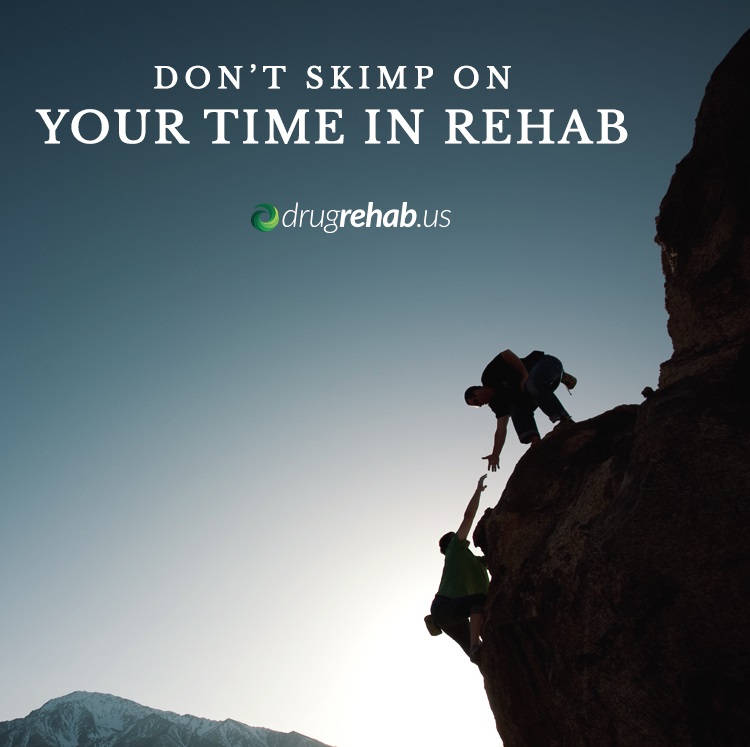 It is also important to understand that the disease of addiction is chronic. Like other chronic diseases, high blood pressure and diabetes for instance, addiction needs continuous treatment over a lifetime. You can never be cured of your addiction, but you can learn to manage it.
It is also important to understand that the disease of addiction is chronic. Like other chronic diseases, high blood pressure and diabetes for instance, addiction needs continuous treatment over a lifetime. You can never be cured of your addiction, but you can learn to manage it.
If you are thinking of going to rehab, know that the time you spend there will set you on your path to lifelong sobriety. It is important to spend enough time during this initial phase of treatment learning how to live a sober life.
Whatever you do, don’t skimp on your time spent in a good and caring rehab facility. Research shows that the best outcomes result from at least 90 days spent in residential or intensive outpatient care.
Why You Should Consider A Long Stint In Rehab
Here are several reasons you should consider a long stint in a good rehab in order to heal:
- Get past detox – Detox, that time when drugs leave your system and you get beyond withdrawal, can last longer than you think. Detox is important, but by the time it’s done, you may find you have limited time to work on actual treatment if your stay in rehab is only 30 days. Going through detox is hard, but it isn’t the part of rehab that helps you learn to be sober.
- Learn new habits –Your addiction is a habit. Your brain has learned a habit of regular drug use. In order to change those habits and learn new ones, you need time. You are going to rehab to learn how to have an entirely new lifestyle. You must take your time on this or your new healthy habits will not take root.
- Heal your brain – Your drug use has caused actual changes in your brain. It is possible to reverse those changes, but it takes time. Research has shown that in brain scans of patients receiving treatment, positive changes are still occurring up to three months after starting treatment.
- Work on relationships – The main goal of rehab is to heal and to overcome your addiction, but there are many other things to work on if you have the time. Your addiction has probably wrecked several of your relationships, for instance. If you spend enough time in rehab, you can work on repairing those.
- Treat mental disorders – Many people who struggle with addiction are also battling mental illness, whether they know it or not. Spending enough time in rehab will give your treatment professionals a chance to diagnose and treat any co-occurring disorders. When you recognize and treat mental illness you have a better chance at being successful at sobriety and living a more enjoyable life.
- Step down treatment – If you can afford the time to do so, your rehab should be followed by a step down in care. This means going from residential rehab to a sober living house or to intensive outpatient care. Doing so allows you to begin to practice your new habits and skills while still having the support and treatment of caring professionals. Going cold turkey from rehab to real life can be a shock and may lead to relapse.
Long-Term Rehab For Life-Long Sobriety
Rehab is an important step toward becoming sober and you should not skimp on it. If you are able to take the time away from work and family, spend as much time in rehab and step down treatments as necessary to help you be successful in your new, sober lifestyle.
Discover How To Choose The Right Drug Rehab For Yourself Or Your Loved One!
Black Wednesday is the night before Thanksgiving and it is also known as the biggest bar night of the year. More than any other day during the winter holidays, this is the night during which many people cut loose and binge drink. The night before Thanksgiving is a night for the young, and it is young people who are most at risk for the consequences of overindulgence.
College students and 20-somethings are coming home for Thanksgiving, and while Thursday is for family, they use Wednesday night as a sort of reunion. Old friends get together to pack the bars and celebrate. If you are planning in taking part in a Black Wednesday event, plan ahead with a strategy of moderate drinking. Going overboard and binge drinking puts you at risk for a number of dangers, including injuries, alcohol poisoning, sexually transmitted diseases and assault.
Tips To Enjoy Black Wednesday Responsibly
Here are some ideas and tips to help you be responsible and to enjoy the night with friends:
 Skip the pre-party/pre-gaming – If you are over 35 and reading this, you may be confused. What’s a pre-party? Yes, young people actually take time to drink before a drinking event. The pre-party is a small gathering, usually at one person’s home, to get lightly buzzed before the main event. This is irresponsible drinking at its worst. Don’t do it. By all means get together with a few close friends ahead of bar time, but have coffee, soda, or mocktails instead of alcohol.
Skip the pre-party/pre-gaming – If you are over 35 and reading this, you may be confused. What’s a pre-party? Yes, young people actually take time to drink before a drinking event. The pre-party is a small gathering, usually at one person’s home, to get lightly buzzed before the main event. This is irresponsible drinking at its worst. Don’t do it. By all means get together with a few close friends ahead of bar time, but have coffee, soda, or mocktails instead of alcohol.
- Eat – Of course you want to look your best for a reunion with old friends, but starving yourself ahead of time is not the way to do it. You need to have food in your stomach or one drink could wipe you out for the night.
- Have a way to get home – To be safe, make sure you know well in advance how you’ll get home. Select a designated driver or plan to take a cab or public transportation home. If you’re going with the latter, make sure you have a friend to come home with you so that you’re not traveling alone.
- Set a limit – Set a limit for how many drinks you will have at the bar or party and be firm about it. A specific goal is important because if you go into the event with the vague goal of not getting too drunk, it will be too easy to go past the point of no return.
- Share your limit – Tell a trusted friend who will be heading out with you that you have a limit and that you want her to help keep you accountable. If your goal is a secret, it’s easy to stretch it further. A friend will help keep you in check. Offer to do the same for her.
- Alternate alcohol with non-alcohol – Whatever your set limit is, have a non-alcoholic drink in between each alcoholic one. This will force you to slow down and prevent you from getting too drunk. Once you have reached your limit, keep a non-alcoholic drink in your hand for the rest of the night. It will help you resist the urge to get another drink.
Always Plan Your Night Of Drinking In Advance
Drinking the night before Thanksgiving can be a fun way to celebrate and catch up with old friends, but it can easily get out of control. If you have a plan set in advance and follow these tips, you can enjoy the night, be safe and have no regrets the next morning.
Planning Ahead Of Time Can Save Your Night…And You Or Your Friend’s Life
It’s important to have difficult discussions with your children. Talking to them about the birds and the bees, heartbreak, peer pressure and other life challenges is necessary because it helps them understand how to make better choices. It also builds a close and trusting relationship between you and them. One of those important conversations should be about substance abuse. If you’re like most parents, you want to tell them to never even try drugs, but what if you used drugs when you were younger? Do you confess? And if so, how do you do it without sounding like a hypocrite?
To Tell Or Not To Tell
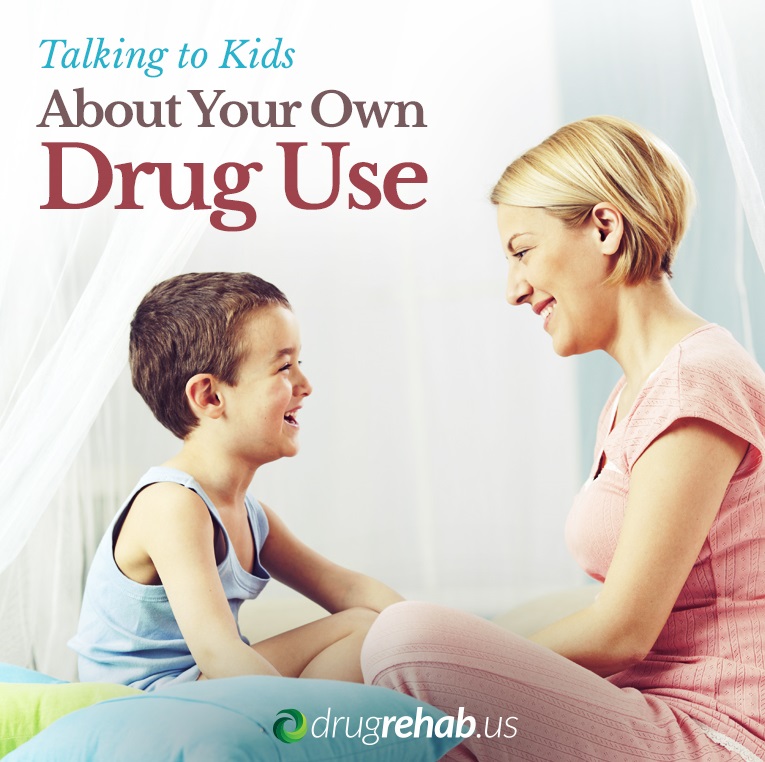 The first thing to consider is whether or not you will disclose your past with drug abuse or addiction. You don’t have to, but know that they could find out another way. Ask yourself how your kids will feel if they learn that you abused drugs from someone else. Age appropriateness is another important consideration.
The first thing to consider is whether or not you will disclose your past with drug abuse or addiction. You don’t have to, but know that they could find out another way. Ask yourself how your kids will feel if they learn that you abused drugs from someone else. Age appropriateness is another important consideration.
Maybe you feel it is important to tell your children. Make sure you wait until your children are at the appropriate age and maturity level to hear about this. No one can tell you if you should or should not tell your kids about your past drug use. The choice is personal and should be made with your children’s best interests in mind.
Tips When Talking To Your Kids About Drug Abuse
If you have made the important choice to talk to your kids about your drug use in the past, there are some things you should keep in mind. Be prepared and be thoughtful. This is not a discussion to rush into or to have without giving it much thought.
Here are some tips to help you make the conversation a successful one:
- Spare the details – Your children don’t need to hear every sordid detail of your past. Be prepared to be honest and to answer their questions thoughtfully and openly, but you don’t have to make it a tell-all. Knowing too much detail will probably only upset your children.
- Talk about negative consequences – As you talk about what you did in your past, put emphasis on the negative consequences. Talk about how drug abuse disrupted your life or about any narrow escapes you had. Remember that the point of this talk is not to share your personal story, so much as to deter your children from trying drugs.
- Listen – This should be a conversation, not a lecture. Once you have explained what you want your kids to know, let them talk and ask questions. Your children always appreciate when you really listen to them. If they don’t have much to say in the moment, ask them questions or encourage them to think about it and come back to you with questions later.
- Remain calm – This conversation is bound to stir up unpleasant memories and feelings. Do your best to keep your emotions in check and to stay calm. Don’t lose your temper, no matter how your children react. And if the discussion takes a bad turn, bring it to a close and return to the topic later, when everyone has cooled down.
Talking to your kids about drug abuse is never easy. If you have a past history of drug use the conversation becomes much more challenging. Remember that the main point of the conversation is to encourage your children to make the right choices and to not use drugs. When parents tell their kids not to use drugs, they listen and are more likely to make those good choices. Have this conversation sooner so that your kids are equipped with the right information to make the best decisions about drugs.
Call Us Now To Speak To Our Professional And Caring Staff!
30 Oct 2014
Tips For Dating A Recovering Addict
Dating can be tough. You meet all kinds of people in bars and clubs and maybe you meet some real strange characters in online dating as well. What happens when you meet a recovering addict? Is that a deal breaker or should you consider getting to know him better? The choice is a personal one, but before you dive head first into a relationship with a recovering addict you should be ready for what lies ahead. It could be the real deal, or it could end up being a nightmare relationship.
Realization With And Support For Your Recovering Partner
 The first thing you should know about dating an addict is that he is, in fact, an addict. Addiction is a lifelong disease and even if he has been sober for years, a relapse is always possible. Also know that love does not conquer all, especially real world problems like addiction.
The first thing you should know about dating an addict is that he is, in fact, an addict. Addiction is a lifelong disease and even if he has been sober for years, a relapse is always possible. Also know that love does not conquer all, especially real world problems like addiction.
Your recovering addict partner will need your support, and as much as you love him, he will try your patience at times. Sometimes love is not enough to make a relationship work in the face of real problems. If you understand these realities and accept them, you may be ready to start dating a recovering addict.
Tips For Dating An Addict In Recovery
Here are some important tips to keep in mind as you take this journey:
- Look for honesty – The fact that someone has struggled with addiction need not be a red flag or a relationship ender. What is important is his honesty and openness. If he has been up front with you about his past struggles it shows that he has largely overcome them and is not ashamed. He has done good work and is willing to share that with you. This is a good sign.
- Be open – You also need to be open about his past. Talk about how it makes you feel and what your concerns are. He should be willing to discuss it with you and can likely allay some of your fears. Starting out on your relationship with solid, open communication will help you have a stronger partnership when times get rocky.
- Find the limits – Some recovering addicts cannot be around drugs or alcohol at all. Make sure you know whether you need to refrain from drinking in front of him and be prepared to make those accommodations if necessary.
- Learn the signs of substance abuse – Relapse is always possible, no matter how put together he seems now. Make sure you know the signs of a slip up so that you can be prepared if he relapses and starts using again. It may be obvious, but he may also be subtle about it. Try not to be over-vigilant, but do be aware of changes and what they might mean.
- Volunteer for therapy – If your partner is still attending therapy sessions or occasional counseling, be ready to join in. Offer to go along if he needs or wants you to. It may be a personal experience for him, but he might also want you to be involved. Be open to the experience.
- Take care of yourself – There will be times when dating a recovering addict is stressful for you. Being caring is important, but don’t forget to take care of yourself. Take time off to be alone and to do things that keep you happy and sane whenever you need it.
Make Sure He Meets Your Needs Too And Understand The Challenges
Dating a recovering addict is not impossible, but it may represent an additional relationship challenge. The important thing is that you find someone who meets your needs. If that person happens to be an addict in recovery, understand the unique challenges and be ready to meet them.
Learn More About Addicts And Their Excuses
Support group membership can be an important part of your recovery from addiction. Experts agree that there are several important elements to effective treatment for addiction. One of those elements must address the social needs of the addict. You can and should go through individual counseling and other types of treatment, but you also need social support. A support group is a great way to get that aspect of treatment.
Ways To Get The Most Out Of Your Support Group
When you join a support group, make sure you make the most of the experience.
1. Finding A Support Group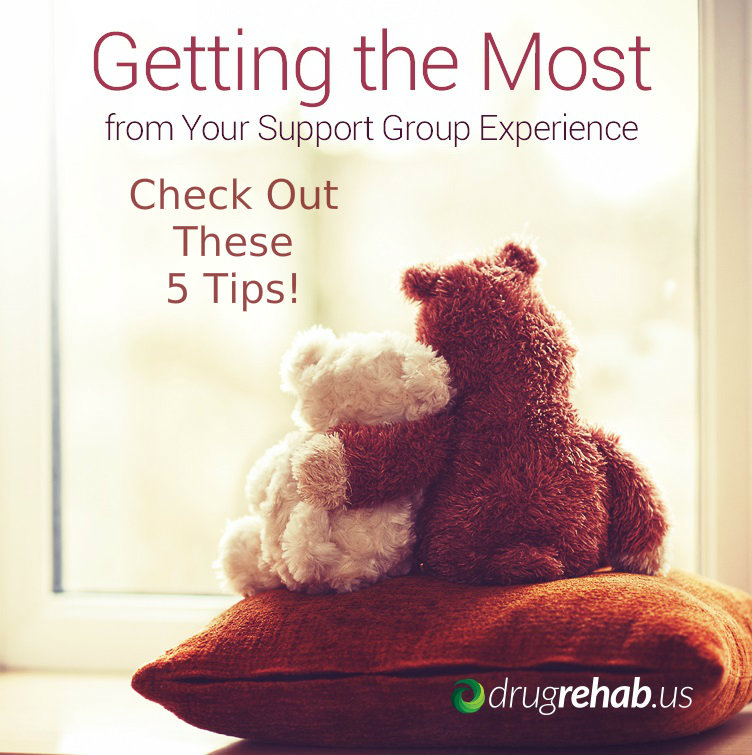
The first important step in having a positive support group experience is finding the right one for you. Don’t be afraid to try a few meetings with different groups to choose the one you like best. There is no rule that says you have to commit to a group after attending just one meeting. Contact community centers, religious organizations, your local library and the local newspaper to find available support groups. You can also speak to your doctor or search online for available groups.
2. Participating In A Support Group
Once you have found a group you like and in which you feel comfortable, start attending meetings regularly. You won’t get much support if you only go to meetings sporadically. You need to develop a rapport with your fellow members, get to know them and let them get to know you, even if it is anonymous. Participating is important too. It’s ok to just listen at first. You may not feel comfortable speaking up right away, but push yourself to start participating after a few meetings. You will get the most benefit from your group when you start to talk and share.
3. Be Honest And Open
An important reason for anonymity in support groups is that it helps everyone to feel better about opening up and sharing. You will get the most out of your experience if you don’t hold back. When it’s time to tell your story, be open, tell the truth and share as much about your experience as you can. Speaking out loud about what you have been through is a powerful tool for healing. The experience of being supported and comforted by those around you is restorative.
4. Work With A Sponsor
Support groups offer more than just a crowd to hear your stories and to which you can listen. They also offer the possibility of developing a meaningful relationship with a sponsor. Working with someone who has been in your position and who has more sober years than you is a wonderful tool for your own sobriety. This relationship can be long term and can be something you turn to in your times of need.
5. Get Involved
A support group is also a great way to get involved in something positive. Replacing your old, bad habits with new activities that have a positive impact on your life is an important step toward long-term sobriety. Get involved in organizing meetings and other events. Volunteer your time and talents to making the group more successful. When you’re ready, volunteer to be a sponsor and help someone else who desperately needs it.
Support groups are powerful instruments for lasting change, but only when you immerse yourself in the experience. Sporadic attendance and weak participation will only take you so far. To really get the most out of a support group you need to attend regularly, get involved, work with a sponsor and open up to your fellow members while also listening to their stories.
I Think I Feel Better … How to Know If Your Therapy Is ‘Working’
20 Oct 2014
How To Face Your Fears Of Being Sober
Admitting to having a problem with drinking or drugs and then getting help are big steps to take. Fear is what holds most people back. There are many fears associated with going to rehab or therapy for addiction. You may be eager to get sober, but afraid of failing. You might fear what your friends, family and coworkers will say and think about you.
Most of all you are probably afraid to be sober. After using drugs or alcohol to silence your voices, cope with troubling emotions or to self-medicate, the idea of being sober is terrifying.
Common Sobriety Fears
There are many reasons to fear getting sober. Your reasons may be personal, but you will likely recognize yourself in these common fears of being sober:
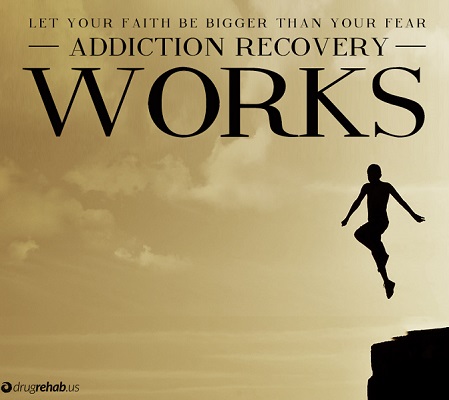 I’ll never have fun again – For some addicts, substance abuse starts and ends with partying. How can you possibly go out with your friends and have a good time if you have to sip a coke all night long? This is a valid and reasonable fear. Your ideas about what is fun will need to change when you get sober.
I’ll never have fun again – For some addicts, substance abuse starts and ends with partying. How can you possibly go out with your friends and have a good time if you have to sip a coke all night long? This is a valid and reasonable fear. Your ideas about what is fun will need to change when you get sober.
- I won’t be able to cope – People abuse substances for a variety of reasons, but largely as a coping mechanism. Whether you drink or use drugs to suppress trauma, cope with social anxiety, deal with stress, or avoid the symptoms of a mental illness, sobriety will mean finding new coping mechanisms.
- I’ll have to feel – Drinking and drugs are good at helping you ignore your feelings of all kinds. You will have to face your feelings when you get sober. The good news is if you get professional help you will have caring people to guide you through the process of recognizing your emotions.
- I’ll probably fail and relapse – Fear of failing at sobriety is a major roadblock, but you have to realize that nearly all addicts relapse once or more. Stop seeing it as a failure and look at relapse as a hurdle to clear, and one that may trip you from time to time.
Tips On How To Get Over The Fear Of Sobriety
- Fear of sobriety is normal, but if you want to save your life and get out of the shadow of addiction you have to face it and get over it – Any fear can be conquered by first facing it. Think about what scares you and put it into writing. Knowing exactly what it is that scares you can help you better face it.
- Next, talk to someone else about it – Even if you only have one person in your life you trust enough with your feelings, that is enough. Talk to this person about wanting to get sober, but being afraid.
- Another powerful way to overcome a fear is to imagine the worst possible outcome and then compare it to what is most likely – You’ll find that your fears are usually worse than what reality suggests. You’re afraid that all your friends will walk away from you when you’re sober. Is that really likely though? Maybe a few will, but those that care about you will support you.
- Finally, take one small step toward facing your fear – Instead of diving head first into rehab, schedule one therapy session or go to one support group session. This small exposure to your fear will actually lessen it. Everything you fear is scarier in your imagination than in reality. Take baby steps toward getting sober and eventually you will realize that you have conquered your fear.
Discover How To Be Empowered Over The Shame Of Addiction – You Are Worth It…You Always Have Been – It’s Time Now To Realize That!


